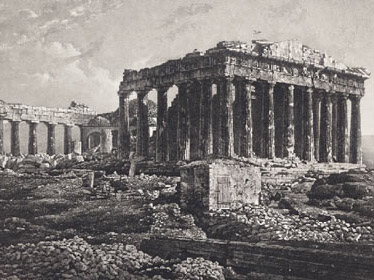The Parthenon
Pericles 438 BC
Built from more than 7500 blocks of marble quarried on Mount Penteli to the east of Athens, the Parthenon was the world's first major construction to be built using this material. The project was also one of the first to have sophisticated pre-planning, including fairly accurate surveying of the amount of marble available before quarrying began.

Blocks were cut to order, to the correct size, with their final position on the building in mind, a practice that significantly saved on weight in transportation. In order to transport the blocks, levers, winches, counterweights and ropes were used, building on the experience of Athens' longstanding ship building tradition. A flagstone road with a uniform slope was built to ease the descent of the blocks down the mountain. Finishing was carried out to narrow tolerances at the construction site by a team of 150 stonemasons and 50 sculptors. The seams between the blocks were consistently much less than the thickness of a human hair. Specialised tools and apparatus were used in order to align the blocks, such as wooden centres for aligning the blocks of the columns one on another.
The Greek statesman and general Pericles (495-429 BC) was the driving force behind the project, as he was for the development of the whole of Athens at that time. His determination and cunning drove a leap forwards in the degree and magnitude of Greek civilization known as the Golden Age of Athens.
